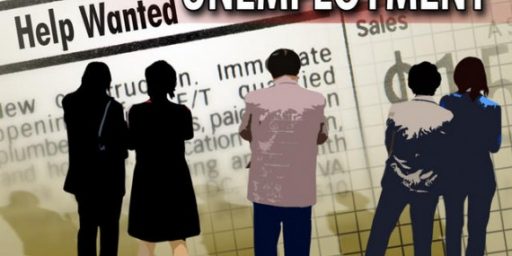Unemployment Insurance Goals
President Obama wants some major reforms in our unemployment system.
President Barack Obama wants unemployment insurance to become a stepping stone for future work by making it easier to enroll in school or job training. Whether he succeeds will depend on the willingness of states and colleges to change the rules.People who have been laid off and want to go back to school often have to give up their monthly unemployment checks. And if they decide to return to school, they often don’t qualify for federal aid because eligibility is based upon the previous year’s income.
Under rule changes Obama outlined Friday, the Labor Department will ask states to make exceptions during economic downturns so that the unemployed can keep their benefits if they go to community college or pursue other education or training.
State governments, not Washington, decide who is eligible for unemployment, and they generally require anyone collecting assistance to be actively looking for work. That can complicate plans to attend school.
Resisting the urge to crack wise about Obama wanting to take control of yet something else that’s not within the purview of his office, I think he’s on the right track here.
Our system of unemployment compensation is idiotic. Basically, it’s run under the assumption that each job lost is equally replacable and by the same means. Whether one has lost one’s job flipping burgers at the local fast food chain or as a senior manager at an investment bank, the system presumes that one should simply knock on doors around town until someone offers employment.
To ensure people aren’t too picky, we make sure to make the payout meager and extremely limited in time. Again, that likely makes sense for most minimum wage jobs. But do we really want to encourage skilled workers to seek the first job that comes along paying more than unemployment benefits?






The system of unemployment insurance reflects an economy that hasn’t existed for nearly 25 years.
This sounds like a good idea.
@JJ
Interesting story in the NYT today about folks who’ve lost their jobs in finance becoming math teachers: Out of Work in Finance, They Turn to Teaching
My head may explode but I agree President Obama has this one right, hopefully this will be something that Congress gets done in a truly bipartisan manner but I just know they will screw it up.
So, who pays for this? The employer who laid the person off? Taxes? A combination of these? It ain’t free, and unemployment insurance won’t sustain a family for long. The top unemployment rate in Tennessee is $275 per week.
My personal story-
I left Intel in November after 8 and a half years with the company working more than full time. I specifically left because I was moving to the town where I grew up due to the insane Portland housing market. I planned this move just before the economy imploded, lousy timing.
Because I chose to leave work voluntarily I was not eligible for any unemployment assistance while I looked for a new job. Said job was very hard to find because of the cratered economy. In my locale unemployment went above 12%. I was looking everywhere, hitting every temp agency and looking at jobs that were barely above minimum wage (and wouldn’t have come close to covering my bills). Consequently I ate trough all my meager savings and had to cash out my 401k to keep my wife and I eating. I have finally found decent work, although it is so far only part time. When I did find work I was getting close to being completely broke, nigh homeless.
Under the circumstances wouldn’t unemployment insurance be reasonable? Given that I’d worked a steady job for almost decade, have a college degree, and was in a field that is highly technical, a little assistance to help me get work in my field (or a related field) makes a lot more sense than saving that unemployment money and having me take some retail or food service job (and thus making a substantially smaller contribution to society as a whole and the economy).
Tlaloc: it sounds good, and assumes everyone would be honest. I remember a story on 60 minutes years ago about people in California who would work for six months, quit, then draw unemployment. They would repeat this pattern. Some would even move out of state and California would mail the check to them. Programs like this would benefit honest people, but unfortunately, most government programs are easily open to misuse.
On another note: my wife and I both work for the same company and will be laid off next month. We will most likely experience some of the pains you have been through. Finding another job is already proving difficult.
James, “purview of the office”? What’s that, a simple enforcer of laws without a proposer of same? Have we ever had a President without agenda? Did we ever really want one?
KenJ, I didn’t think we got unemployment in California after quitting, or even being fired for cause. In the old days at least it had to be a lay-off.
On the broader question, I’ve been thinking about unemployment compensation, wondering:
1) if it makes sense for it to be per-state and not national
2) if it should be integrated with welfare, and just called the “safety-net”.
“I lost my job … I may need to tap my safety net.”
I would expect phase-one to be based on earning of the newly unemployed, but … if someone ends up being long-term, then the compensation really has to drop to something like welfare.
We might afford to give an Amiga programmer some short-term assistence, but it’s up to him to find the motivation to be an Oracle programmer, or whatever.
Do I detect a bit of entitlement attitude here? I know of many people who have been wise enough to save considerable amounts of money, on teacher’s salary levels even, by living within their means. Safety nets can be built by private individuals who understand the wisdom of saving. Public safety nets should provide temporary, life saving assistance. If someone wants to go back to school, then apply for educational aid.
I think we can observe, Pete, that all market democracies have some forms of (1) unemployment, (2) welfare, and (3) educational aid.
We’re just talking about how to balance them here.
If you are saying “don’t go to the unemployment office, go to the education aid office” that might be OK.
Ultimately it all has to pass cost-benefit analysis. Do the training programs actually work, improve employment, earnings, future tax revenues?
The unemployment safety net is paid for by the tax payer. Educational aid is a mix of free rides and loans. Is it not better for society to promote some responsibility for repayment of aid (loans) versus a free ride for self improvement?
Pete, did you forget the massive state and federal funding we have for higher education?
Not paid by tax payers?
(Some countries go even higher, with free college, just like free high school. I’d love it if we figured a way, perhaps with internet technology, to make college so cheap that we could do that too. Thinking that college costs are a “loan” problem is wrong, IMO.)
No I didn’t forget as I said educational aid is a mix of free rides and loans. Pell grants rarely cover the total cost of education, so loans are the backup. My point is that loans require some degree of responsibility for repayment, but drawing unemployment doesn’t, except for the former employer in the way of higher premiums, which are passed along to the consumer, if possible.
I’m rather skilled in the broadcast profession. During my time in the profession I did rather well, and was seldom out of work for anything longer than a vacation I wanted to take. As a matter of fact, I viewed time between jobs as a vacation. That simply the way things are in that profession. Or, were.
These days, as it stands, there are quite a few less people working in that profession, and they are working for something less than used to be the norm.
There are perhaps no more than a few dozen people in this country who know how to run a steam locomotive. Time was, there were quite literally tens of thousands of people who understood that trade and made their living at it. The zeiss, not so much.
I have a friend who owned a record shop for twenty years. Similarly, there are not so many of those anymore, either.
I have a friend who used to support united press international’s teletype system, and is very definitely a skilled individual where that is concerned.
By now, you’ve got the trend on looking at. So, the question; Are we’re really prepared to give such skilled people more time to find themselves another job, despite the fact that fewer people with those skills are actually being hired, Or should we rather encourage such people to develop other skills and find other employment?
The trouble I have is that what Obama proposes does not really fill that bill, though admittedly it’s at least a temporary help. If I recall rightly, colleges cost money too, even the community college kind. Simply offering a fraction of what the skilled individual was making at his old position is that going to cover is current bills and his education.
Further, comes the more basic question of just where is that money coming from in the first place?
Odograph: I cannot find a 60 minute archive going back that far – probably in the 70’s. I remember the episode was clearly about people playing the system. You are right, and I do understand that those who are fired or quit don’t qualify for unemployment, unless they can prove they were unfairly fired. If the hearing officer agrees with the employee, then they receive unemployment benefits. I have terminated employees for cause who won at a hearing because they showed up with a lawyer, or the hearing officer just didn’t side with employers. Hearing officers don’t want to challenge any lawyer, no matter how weak their case. However, my main point is: what is to prevent people from quitting a job just to take a break from work. It’s another one of those warm and fuzzy sounding programs that will be abused.
Well Pete, as I said, I think we have our heads in a wrong place when we think of education as a “lending” problem.
We don’t treat k-12 that way, we see them as a social good that reduces poverty, crime, inequality. We don’t say “you’re going to need a loan for high school.”
The thing is, we probably can’t afford to give free college to everybody, but especially the music majors. (Why do we even have so many music majors at state schools? Oh I forgot, to teach and make more music majors who can become postmen.)
What we’d probably do, if we were rational, is more testing, and give free education in the “useful arts.” By that I mean academic path and medicine, but also practical path and welding.
It’s true, we don’t. We treat it as a government enterprise, which in turn is dominated by leftists and the unions. Which may explain the test scores we’re getting and the fact that we have on the whole the least educated ‘students’ coming out of our ‘high schools’ than we’ve ever seen before.
You’re not seriously proposing doing that to our colleges and universities, are you, really?
Odograph, your comment on music majors is unsettling. If America is going to be remembered for anything, it will be its use of democracy, and jazz music, the only real cultural history we have that is not involved in the political sphere. I have never once met a music major turned post-man, but I will assume that you have met many and leave it at that.
That aside; while I am very aware of the amount of people playing the unemployment system (an acquaintance of mine taking a 6 month vacation to some warm beach in Mexico while reaping benefits), there really should be more emphasis on the potential of each person to ‘rise above’ the minimum wage positions that we are forced to look for.
I was denied unemployment 3 times, despite my truthful willingness to dropout of school to take any job – part time, full time, seasonal etc., whatever came my way that is – simply because my schedule ‘posed a substantial degree of difficulty in working at the earliest possible time.’ My willingness to dropout also included the unfortunate circumstance of having to pay nearly $4,000 in pell grants.
Either way, it would be hard to subsist, so I chose to stay in school, opting for the ‘long-term solution.’